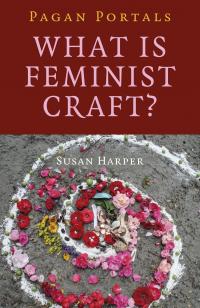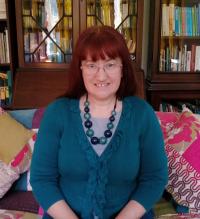
Feminist Craft - Susan Harper
Chapter 3: The Witch
Why Witchcraft?
Why choose Witchcraft as the cornerstone of a feminist religious practice? There are a lot of reasons, and there has been a great deal of writing on the topic, but one major reason is that the Witch herself has been a powerful symbol of power, and particularly the power held by women, throughout history and across cultures. Even in cultures in which Witches are stigmatized and have been (and still are) persecuted, the power of the Witch has never been denied. As I discussed earlier, Witchcraft has always been about the claiming and exercise of power. And while people of diverse genders have always been, still are, and will always be Witches and capable of powerful Craft, the power of the Witch has been most often associated with women (and to some degree with anyone of a gender other than man). Witchcraft accusations cross-culturally have been a way of enforcing social norms, especially gender norms, and of punishing those who step outside those norms. Who else to choose as a folk hero and sacred symbol than the woman who pushes social boundaries and exercises her own power and terrifies the existing social order in the process? Feminist relcamations of the Witch have stressed the ways in which knowledge typically associated with women (and other marginalized genders, but predominantly women given the persistence of the gender binary in the West) have been lumped under the label of Witchcraft -- herbal healing, contraception, abortion, birth, preparation of the dead, even knowledge of gardening and animals and Nature generally. A return to a more holistic way of living was one of the major features of the Second Wave of feminism that gave rise to Feminist Witchcraft in the US, and so it is unsurprising that in exploring these bodies of knowledge, the image of the Witch emerged.
Starhawk has written that reclaiming the image and the word Witch is key to reclaiming our own power. It is a word that has been, and in many regions of the world still is, used to hurt people -- most of them women or LGBT+ people -- who step outside the bounds of what is considered proper and appropriate for them. Recognizing Witch as a word imbued with power and taking it as a mantle for oneself can be key in shifting our view of power, including our own agency.
And Witchcraft, as we typically frame it in Western Contemporary Pagan circles and in Feminist Witchcraft in particular, is all about agency. Witchcraft is something we do, most often in response to a need or desire to effect change in some area of our world. Witchcraft is our way of asserting that we have some control or influence over our own lives, of taking a situation in hand and using the available resources to influence an outcome. While Witchcraft should never be the only tool brought to bear on a situation, it is one of the many technologies we have available and can be an incredible source of empowerment. And for this reason, I (along with other writers and practitioners) think that Witchcraft and Feminism make an ideal pairing -- they are both concerned with bringing about change, both concerned with marginalized and disempowered people taking back their power from a system that would deny them. While Witchcraft might not be the only spiritual system that supports and is supported by feminist values, the two do seem natural (forgiving the pun) sisters.
Finally, Witchcraft is well suited to an explicitly political spiritual practice (and an explicitly feminist political spiritual practice) because, as I discussed in the Foreword, Witchcraft has historically been, and remains, one of the tools used by the marginalized and oppressed to fight back against systems of oppression. While I don’t want to draw too close a comparison between, say, the middle class White women in my Goddess circles and people who have borne up under systems such as slavery or repressive regimes around the world, I do think it is useful to see the ways in which oppressed groups have some common cause and thus might turn to Witchcraft and other similar sacred technologies to exercise agency and combat oppression. Certainly the rise in interest in Witchcraft, and particularly Witchcraft directed at social justice and political aims, during the presidency of Donald Trump speaks to the ways in which even today people who find themselves up against a repressive system will reach for Witchcraft as a tool -- or a weapon.
Witchcraft is a Craft
So, big philosophical questions and theological explorations are great, but isn’t Witchcraft about actually doing things? Absolutely! Witchcraft is a Craft -- it is something we do, it is an act of creation. While some people may find power in simply venerating Goddess, I would argue that without the practice of ritual and Witchcraft, those folks are not Feminist Witches -- they are Goddess Spiirtuality practitioners, and that’s good and valid and beautiful. To be a Witch of any stripe, it is necessary to practice. That practice can look a lot of different ways, but it is above all active rather than passive.
Witchcraft involves the practice of magic -- let’s get that out of the way, for those who were wondering -- but magickal practice is not the sum total of what it is to practice Witchcraft, at least not in Feminist Craft as I know and practice it. While spells, rituals, and magickal workings certainly form an important component of an active Witchcraft practice, what sets Witches apart from other magickal practitioners is the complex set of skills and practices besides spellwork that fall under the Witchcraft umbrella. These include herblore for medicinal and as well as magickal purposes; embodied practices that allow us to access our own sacredness; divination; knowledge of stones and crystals for magickal and healing purposes.
Magick, as Starhawk has said, is the act of changing consciousness at will. I add to this that it is the act of changing consciousness at will in order to effect change in the outer and/or inner world. While not all people who practice magick consider themselves Witches, and not all magick is Witchcraft, magick is a key element of Feminist Witchcraft. The desire to effect change in the outside world, and within our inner worlds to help us heal from the damage of the patriarchy, underlies much of magickal worked in Feminist Witchcraft spaces.
Embracing the Witch
Unlike more traditional Witchcraft traditions such as Wicca, there is no set hierarchy within Feminist Witchcraft. There is no lengthy learning process, and no formal initiation unless the individual Witch desires such a ceremony to mark the rite of passage of claiming the name of Witch. We do not “become” Feminist Witches -- we embrace the fact that we already are Witches at our core. We take the time to learn the skills and Craft of Witchcraft, but all the essential tools we need are already held within us. A common maxim in early Feminist Witchcraft writings is that “every woman is a Witch.” I believe this to be true, and I believe that people who are not women can and do have a Witch inside them waiting to be embraced.
How do we embrace the Witch within? I’ve always liked the statement from Second Wave Feminist activist group WITCH (Women’s International Conspiracy from Hell) that encouraged women to say “I am a Witch” three times before a mirror, and then really think about what that meant. While WITCH in its original form was a performance art group and not a Witchcraft group per se, I find their use of the image of the Witch as symbolic of our inherent power to shape the world power and evocative. Consider starting your Feminist Witchcraft journey by standing before the mirror and speaking the words “I am a Witch” and reflecting on how you feel!
A key aspect of embracing the Witch within and beginning a journey into Feminist Witchcraft is taking the time to see the sacred in the everyday, the magickal in the small moments. It may be tempting to assume that you need to give yourself a crash course in feminist politics and occult science to embark on this path. And while continuing to read and raise your awareness of both those things, as well as paying attention to the very real issues at work in the world around you, will be vital to using your Craft towards greater justice, in a very real way the first steps into Feminist Witchcraft are very small. A well worn maxim of feminism is that the personal is political. When we begin to embrace our own power and to foster our own growth, it’s not just personal healing -- it’s a political act of seizing our power back from kyriarchy, from the forces that would tell us that we are not powerful beings. And while simply doing this work on the personal level won’t necessarily change the world or end injustice, it does equip us to imagine a different world, a more just world, and to relate to each other and to ourselves in a justice- and love-centered way that does allow us to work for wider societal change.
One of my first teachers in Feminist Craft told me “Your first year in the Craft is all about facing your shit.” While it might not be an elegant statement, and probably won’t show up on any Instagram posts anytime soon, this might be one of the truest things anyone has ever said to me about Witchcraft. Witchcraft is above all a tool for healing -- for healing others, for healing the Earth Herself, and for healing ourselves from the damage done to us on macro and micro scales. No one escapes a patriarchy or a kyriarchy unscathed, and women and other people who are not men bear much of the brunt of this systemic violence. And that’s before we even begin to touch all the traumas and injuries that happen to us within our families, our relationships, and our personal journeys through this life. I do not believe anyone has to be “perfectly healed” or “entirely whole” to practice Witchcraft -- if this were true, there would be vanishing few Witches on the planet. Rather, I believe that as we enter into Witchcraft, and especially politically centered Witchcraft, we have a duty to recognize the damage that has been done to us, and the damage we have inflicted on others and on the planet, and take steps towards healing those things. Witchcraft is just one technology we can use to heal the wounds of patriarchy, kyriarchy, capitalism, and all the myriad sources of injury we encounter, and it should not be the only one -- I am a strong advocate of therapy and other mental healthcare (and for it being accessible to all), for education, for medical and complementary healthcare, and for any other tool that we can use to bring ourselves to more balance and wholeness. I do believe, however, that Witchcraft (and perhaps spiritually more generally, but most definitely Witchcraft) allows us to face, name, and heal things that the other technologies available to us cannot touch. The act of taking one’s power back is in and of itself a path to healing, to wholeness, and authenticity.
Feminist Witchcraft is a sacred technology that equips us to take our power back. In the next chapters, we’ll move from theory to practice and examine specific tools and techniques we can use in that reclamation.
Categories:
0 comments on this article






